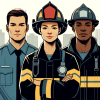Some of the best training officers I know generally subscribe to the concept that egos and learning don’t mix. If you have ever seen the sign outside the training room that states “check your ego at the door” you understand what I am talking about. In EMS there are always opportunities to receive on the job training or to learn a lesson. As a young paramedic I learned quickly who would spend the few seconds to provide a lesson or clarify a point and who to steer clear from. These individuals became my mentors and would seek me out to demonstrate interesting patient presentations and EKG’s. Through mutually shared enthusiasm, I grew through their mentoring. Whether from our patients, allied health professionals, senior employees, junior employees, nurses or doctors, the potential for lessons are always present. With that in mind the question is this, are you ready to receive the lesson or is the ego blocking your brain?
Although there are many lessons to be learned, I see many providers missing the opportunity to improve their practice, enhance their knowledge, or change their behavior towards a specific process/situation. These individuals think that they know or have experienced more than the individual (patient or clinician) providing the lesson and thus no useful information could possibly arise from their teachings. One of the best ways that we learn in the field is by evaluating the actions and reactions of others (positive or negative). How did the emergency room nurses or attending physician react to the patient? What did they do first, second and so on? Some field providers (for whatever reason) become defensive when their treatments or expectations aren’t in line with hospital actions. In an industry where I can’t be wrong thus you can’t be right because people’s lives are at stake, for some learning can be difficult. The same is true for ambulance personnel who take over care from first responders. This defensive feeling (some would call your ego) becomes a blockade to new lessons, new ways of doing things and true evaluation of what’s occurring (reality). The lessons don’t stop with the providers in the emergency room. The lessons continue on as the patient progresses through the system. Emergency room physicians and nurses learn from critical care providers in the intensive care units, whom in-turn learns from the surgical staff.
I have transported several patients that I thought were less sick than the attending physician, only to find out later that the patients were very ill with occult injuries/illness. I have passed off patients to transporting medics who I would have treated less aggressively and failed to learn from the situation. These scenarios caused me to react; they brought up questions regarding my treatment and defensive postures to my thinking. At these memorable crossroads in my career I could have let my ego get in the way and degraded all of the subsequent actions of the receiving hospital/transporting medic or I could watch, evaluate and learn from the situation. There are great lessons to be learned and experiences to be gained from these judgment and/or treatment errors. Had I not paid attention to the attending physician or transporting medic, and let my bruised ego get in the way, I would have missed the entire lesson and continued practicing less informed.
All too often, field providers forget that they are a small, yet important, spoke in the wheel of emergency healthcare and not the entire wheel. If you have ever intubated a patient without taking their dentures out, there is a critical care nurse who is not happy with your actions. If you have ever placed an IV in an overdose patient’s wrist that subsequently required four point restraints, there is an ER nurse who wished you didn’t. If you have stymied the evaluation of a receiving physician through medications, there is an MD who thinks you should have held off. If you start IV’s only in AC (Antecubital) vein, there are lab technicians less than happy with your job. An amazing team effort must come together for the survival of our most critical patients. This effort starts in the field through recognition/evaluation/treatment and is processed through to the ED (emergency department) OR (operating room) and ICU (intensive care unit). Whether you work in the ER, ICU, CCU, Public Health, or the field, all team providers have different priorities for their level of care to meet the single goal of patient life quality.
In conclusion, it is vital to realize the role of ego and the effects it can have on ones learning and evolution. Limiting ego from your work will allow you to evolve and mature as a field provider. Learning and implementing small lessons from others fosters positive images of field providers and will make you a better more knowledgeable provider. People are more willing to provide lessons when others are set and willing to receive lessons. Although I am using an EMS analogy to make the point, all of these scenarios translate well into the fire service. If you didn’t learn anything from the article, well…never mind.


